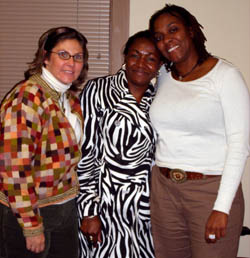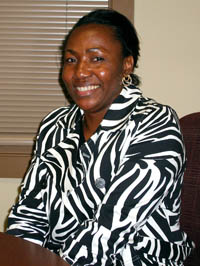 |
|
|
Politics
Main Page |
Immigrant Mother Struggles against Abuse, Homelessness
By Carrie Dindino BETHESDA, Md. - Hermine Timamo starts every morning at 4:30 a.m. She leaves her one-bedroom apartment in Silver Spring by 6 to drop off her 2-year-old son at day care before heading to school or to her job as a store supervisor for a CVS. But two years ago, life was very different for the then-35-year-old Cameroonian immigrant. She and her 10-day-old son, Mael, were homeless, and living in a hotel, after having endured more than a year of abuse from her husband. She and her son would spend the next nine days in a hotel the crisis center provided for them. “I wanted to go back home. Living nine days in a hotel -- I wasn’t used to it,” said Timamo. “I just wanted to go back.” She didn’t go back. Instead, she went through two residential programs focused on building self-esteem and life skills. The programs are run by the National Center for Children and Families, a nonprofit agency that supports families in the D.C.-metro area. “People who are in domestic violence relationships shouldn’t stay” in the relationships, Timamo said. “There are a lot of places to go. They have to talk it out and let people help them, or they might lose their lives.” In May 2007, about a year and a half after police took her from her home, Timamo had gotten her life on track. Working with a case manager and attending domestic violence therapy, Timamo had gained the confidence she needed to learn English, legalize her immigration, find a job and get an apartment for herself and her son. She is now going to school to get her cosmetology license -- the first step in reaching her dream of opening her own salon. Taking the First Steps During her stay at the hotel, Timamo filed a domestic violence suit with the Montgomery County District Court seeking a protective order against her husband and custody of her son. She had no lawyer with her at the first hearing and told the judge that she wanted to go home. “They asked me in the court, ‘What [do] you want to do?’ and I said I want to go back. He asked, ‘Are you sure?’ ” Timamo recalled of the judge. “The next thing the judge did was to postpone the hearing for eight days.” The judge told Timamo she needed to bring a lawyer to the next hearing. While she waited for the hearing, the Montgomery County Crisis Center referred Timamo and her son to the Betty Ann Krahnke Center for New Beginnings, a domestic violence emergency shelter run by the National Center for Children and Families. The center serves Montgomery County families who are recent victims of domestic violence. “The first day I was at the shelter, it wasn’t easy. … but it was the right place,” she said. She said she has no family in America and didn’t want to stay at a friend’s house. Timamo did not speak any English when she arrived at the shelter, only French, which is one of Cameroon’s official languages. She had taken nothing with her when she left the house because she did not realize it would be four months before she would be able to go back to it. “I took just two clothes, my son and me,” she said. Some aspects of the shelter grew on her quickly. She laughed as she recalled, “It was good because I ate there without cooking Monday through Friday. … And that was like home, because when you have a baby, people are cooking for you.” When Timamo returned to the Montgomery County District Court eight days later for her second hearing, she had changed her mind about where she should be. “The next hearing, I wasn’t the same,” she said. Timamo had met with a case manager and a therapist, who helped her understand her situation, she said. The judge granted Timamo a one-year protective order against her husband. She was granted custody of her son, and her husband was allowed limited visitation. Timamo also filed for a divorce during this time, though it would not be finalized until April 2006. Timamo and Mael would spend the next four months living in the emergency shelter. During her stay Timamo was required to work with a case manager. She also had to participate in group and individual domestic violence trauma recovery therapy. She said there were many rules there, but they made her strong. “We try to give them structure so that when they leave they know you don’t really have to be confined to have structure,” said Tonya Fulwood, division manager of family services for the National Center for Children and Families. After four months at the shelter, Timamo was accepted into the center's Family Stabilization Program, a transitional housing program in Montgomery County that teaches families household functioning and helps them resolve problems that led to their homelessness. Timamo’s case manager referred her because she was “in imminent danger of homelessness,” said Fulwood. In the program Timamo was required to have nightly meetings with a case manager and take parent-education courses. In March 2006 she moved with her son into an FSP apartment in Montgomery County. Living in the apartment was more like the life she had left behind in Cameroon, she said. Not the Life She Expected in America Timamo was born in 1970 in Cameroon, a country on the west coast of Africa that touches the Atlantic Ocean. She was one of eight children. In 1989 she finished training to be a medical assistant but was unable to find paying work. So she turned to business. She said she opened three shops in Douala, the economic center of Cameroon, selling sneakers and beauty supplies. She lived with a first husband in a house in the city. But they were having troubles. She said they had been unable to have a child, and her husband blamed it on her. It wasn’t until 2003 that Timamo got a business visa to travel to America and was able to attend a friend’s wedding. She met her future husband, and baby’s father, at the wedding. He was a Cameroonian immigrant already living in America. She said she traveled to America three more times in the next six months. In March 2004 she decided to move. She divorced her first husband and moved in with her future husband, in her new home in America. Timamo said she didn’t really know her future husband, and their relationship quickly went bad. He began to “hit and slap” her, she said. Timamo said her husband was raised by an abusive household, and that was the way he believed he should treat his wife. She said she had planned on leaving him when she discovered she was four months pregnant. “When I was pregnant, we got married,” she said. The physical and emotional abuse continued, Timamo said. On Oct. 10, 2005, Timamo went into labor a month early. Within hours of giving birth, she said she was already thinking about leaving her second husband. She put her own last name on her son’s birth certificate and had all of his documents sent to a friend’s house. Timamo and her husband took Mael home, but eight days after coming home Timamo said her husband began looking for his son’s documents. She said the fighting started with words but when she told her husband to stop going through her purse, he pushed her and she fell back against the door. She called the Montgomery County Crisis Center that day and left the only home in America she had ever known. A Place of Her Own
After moving into her transitional housing apartment in March 2006, she met with a case manager every night to discuss financial and emotional issues. Timamo said it was like talking to her mother. Timamo was able to put Mael in day care sponsored by the program, while she continued to attend class to overcome the trauma of domestic violence. The program also provided her with money each month for public transportation, as well as supplies for her small family’s needs. Timamo was still not able to work, though, because her immigration status had not yet been legalized. Timamo said many places would not even consider her for a job because she didn’t have a Social Security number. “It was so difficult,” she said. In May 2007, 14 months into the transitional housing program, Timamo’s status was legalized and she applied for a job at a CVS in Silver Spring. She was hired as a cashier and in three months - because of her customer service and cash management skills, she said – she was promoted to chief supervisor of the store. A month later, in June 2007, she graduated from the transitional housing program after securing her own apartment. She still meets with a case manager once a month. She said her focus now is on getting her cosmetology license. She hasn’t give up on the dream she set for herself while in the emergency shelter, to open her own salon in 2010. But before that Timamo hopes she will be able to get a house for herself and Mael. “I really want a house,” she said. “My son is born here, so I have to think like that.” Maryland Newsline's Carrie Dindino can be reached at computertech-online@jmail.umd.edu. Copyright © 2007 University of Maryland Philip Merrill College of Journalism Banner graphic by Hortense Barber and Diego Mantilla. Banner photos of homeless person's cart and homeless man sitting are courtesy of Greg Sileo.
|


